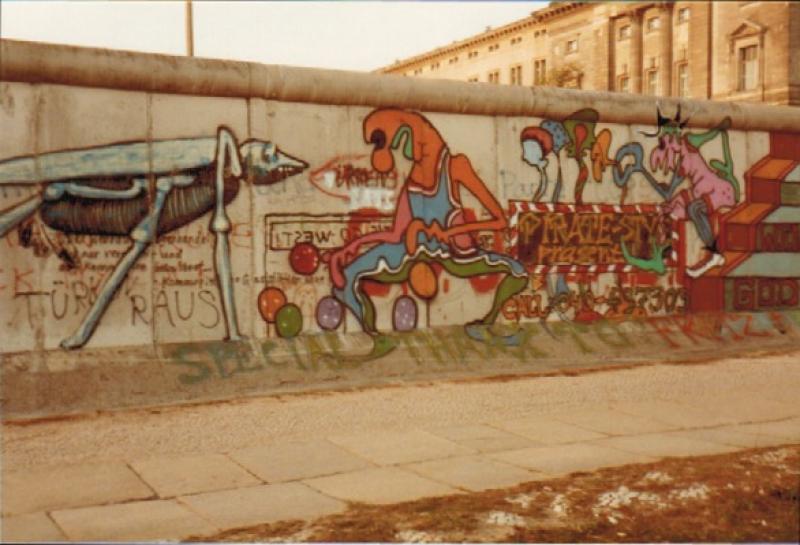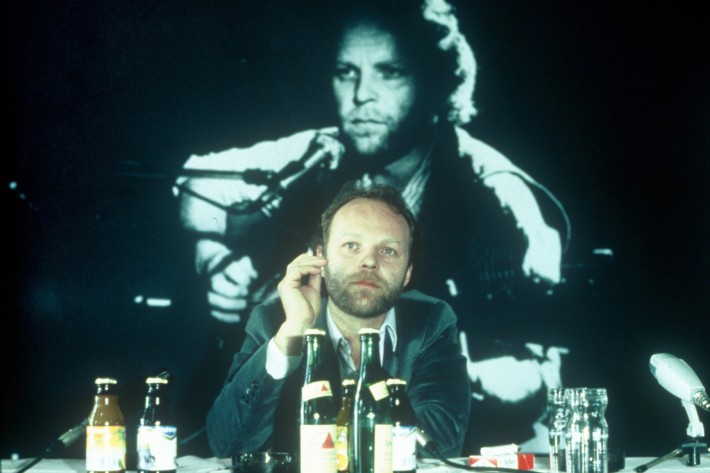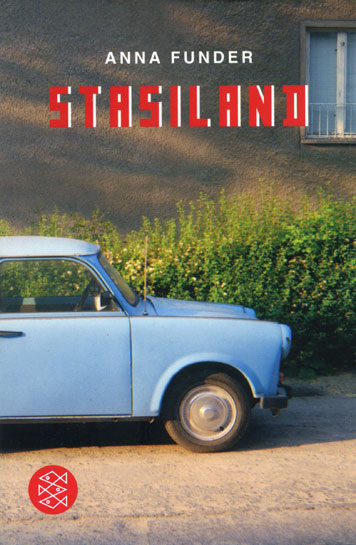Listed: Wall Flowers - The Best of Berlin | reviews, news & interviews
Listed: Wall Flowers - The Best of Berlin
Listed: Wall Flowers - The Best of Berlin
It divided a city, but the Wall produced great stories and songs, dramas and films. We pick our favourites

It has long since become a cliché that the news of John F Kennedy’s assassination is implanted on the memories of those who remember hearing it for the first time. As that generation thins out, their children are now likelier to think of the breach of the Berlin Wall 25 years ago this weekend.
To mark the anniversary, theartsdesk’s writers have come together to nominate works of art inspired by divided Berlin. Necessarily, many of the songs, films and books suggested here have a British perspective, but others are more indigenous commentaries on what one film memorably refers to as the lives of others.
A note on the main photograph illustrating this edition of Listed. We don’t normally publish our own grainy snaps but this one is different. It was taken by theartsdesk’s film writer Graham Fuller in 1984. It depicts a section of the west side of the Wall. “Most of the graffiti appeared anonymously after the Wall was reconstructed in 1980,” he notes. “Little graffiti appeared on the east side since would-be artists were not able to get close enough.”
Our first Wall flower is supplied by the great laureate of the Cold War, a British novelist who was himself a foot soldier for MI6 and knew the story from the inside.
The Spy Who Came in from the Cold: John Le Carré, 1963
This quintessential Cold War spy novel was published two years after the building of the Berlin Wall. Beginning and ending with scenes involving East German border guards, it is a page-turning thriller that centres on Alec Leamas, a disillusioned British intelligence officer. The film version, released in 1965, stars a tortured Richard Burton, and is a classic. Aleks Sierz
"Heroes": David Bowie, 1977
“We can beat them, just for one day.” A Cold War classic triggered by listening to Neu!’s track “Hero!” during Bowie’s post-alien Berlin period. The immense sound with Brian Eno’s VCS3 synth and Robert Fripp’s feedbacked guitar gives the song of doomed lovers in the shadow of the Wall an ironic (the title is in inverted commas) triumphalism. Peter Culshaw
 Fatherland: Ken Loach, 1986
Fatherland: Ken Loach, 1986
Trevor Griffiths wrote this brooding historical thriller about an East Berlin protest singer (Gerulf Pannach, pictured), who crosses Checkpoint Charlie and condemns vestigial Nazism in the West German government as fiercely as he condemned the East’s betrayal of Marxism. Constantly followed, the spiky dissident and a supposed journalist (Fabienne Babe) travel to his defector father's English refuge for a climax that justifies the paranoid mood. Graham Fuller
Wings Of Desire: Wim Wenders, 1987
Wenders' love letter to a divided Berlin sees angels over the city observing its complex life, but unable to join in. Beautifully shot, with dialogue inspired by Rilke's poems, and performances from Bruno Ganz, Solveig Dommartin and Peter Falk, Wings Of Desire could only work in Berlin – as demonstrated by its disastrous Los Angeles remake City of Angels. Simon Munk
Rostropovich plays Bach by the Wall, 13 November 1989
This was no publicity stunt: the world's greatest cellist wanted to mark part of the history in which he had already played a major role. Stripped of his Soviet citizenship along with his wife, soprano Galina Vishnevskaya, for supporting Alexander Solzhenitsyn back in 1972, he would go on to fly straight to Moscow when he heard news of the White House coup and play on one of the soldier's tanks. Bach's Cello Suites would always be the symbol of Germany's freedom and greatness, so his choice in 1989 was an inevitable one. He says to the crowd it comes straight from the heart, and he's telling the truth. David Nice
 The Innocent: Ian McEwan, 1990
The Innocent: Ian McEwan, 1990
In the rubble and spy tunnels of 1955 Berlin, McEwan creates symbolism of seething decay through which to follow his ingénu protagonist Leonard Marnham’s journey of increasingly grisly self-discovery, including a bloody, graphic death McEwan now claims he regrets writing. Plotting is as tight as the drum on which McEwan beats a lament for the loss of innocence, and the horror which ensues. Matthew Wright
Good Bye, Lenin!: Wolfgang Becker, 2003
The advent of capitalism did not improve the lives of all East Germans: even today, the so-called "new Bundesländer" remain economically depressed. Good Bye, Lenin! shows the mixed blessings brough by the Wall's fall from the point of view of a young man, Alex, who "recreates" the GDR to save his ailing mother from a fatal shock in a sweet, poignant film that winningly combines love story, family drama and caper comedy. Perhaps appropriately, its global success laid the groundwork for the successful marketisation of "Ostalgie" (the nostalgia felt by some "Ossis" for the sights, sounds and cultural textures of life in the GDR), which is now well catered-for by the Berlin tourist industry. Hanna Weibye
 Stasiland: Anna Funder, 2003
Stasiland: Anna Funder, 2003
Curiously, the big international bestseller about the experience of living in East Berlin is by an Australian journalist. Placing classified ads to find her interviewees, Anna Funder’s Stasiland (German edition pictured) sought out those on both sides of the ideological divide: the Stasi’s omnipresent spies, and those whom they spied upon in history’s biggest pre-internet network of state surveillance. The resulting psychological profile is of an entire society suffering from PTSD. Jasper Rees
The Lives of Others: Florian Henckel von Donnersmarck, 2006
This marvellous movie, with its grey East Berlin glinting in the rain, was an improbable fairytale for westerners. A committed, clever Stasi officer questions his beliefs, to sabotage the investigation closing in on a privileged playwright. Superb acting conveys a terrifying awareness that the state is almost – but not quite – omnipotent, as everyone spies on everyone and no one gets home free. Marina Vaizey
 Berlin: David Hare, 2009
Berlin: David Hare, 2009
Hare himself performed searching monologues Berlin and Israel/Palestine-focused Wall: one barrier keeping people in, the other keeping people out. His frank meditation on Germany’s restored capital blends political inquiry with personal musing, as he seeks the soul of modern Berlin and asks how much history should be left behind. Marianka Swain
Over There: Mark Ravenhill, 2009
There have been few odder political parables than Over There, the Royal Court play by Mark Ravenhill that cast actor-twins Luke and Harry Treadaway as Berlin twins separated by the Iron Curtain. At one point, these real-life brothers stripped to their skivvies, so that one could lick all manner of glop off the other’s bare torso: an allegorical first, to be sure. Matt Wolf
 Wrapped Reichstag: Christo and Jeanne-Claude, 1995
Wrapped Reichstag: Christo and Jeanne-Claude, 1995
Six years after the fall of the Wall, and with Bonn still the official seat of power, artist duo Christo and Jeanne-Claude finally realised their long-awaited plan for wrapping the Reichstag. Throughout its turbulent history, the building had remained for many a powerful and resonant symbol of democracy. Finished in 1894 – decades after Germany’s unification – the building had fallen into disrepair following the fire of 1933 (whether Hitler had sanctioned the attack or not, the Nazis certainly exploited it for political gain, using it as a pretext to disempower parliament and outlaw all political opposition).
The wrapped Reichstag was seen by five million visitors during two weeks of the summer of 1995, before work finally began on a four-year renovation by Norman Foster. A new glass dome, complete with viewing platform, was included to signify the openness and transparency of democracy. A full decade after the fall of the Wall, Berlin was reinstated as the capital of a reunited Germany. Fisun Güner
The future of Arts Journalism
You can stop theartsdesk.com closing!
We urgently need financing to survive. Our fundraising drive has thus far raised £49,000 but we need to reach £100,000 or we will be forced to close. Please contribute here: https://gofund.me/c3f6033d
And if you can forward this information to anyone who might assist, we’d be grateful.

Subscribe to theartsdesk.com
Thank you for continuing to read our work on theartsdesk.com. For unlimited access to every article in its entirety, including our archive of more than 15,000 pieces, we're asking for £5 per month or £40 per year. We feel it's a very good deal, and hope you do too.
To take a subscription now simply click here.
And if you're looking for that extra gift for a friend or family member, why not treat them to a theartsdesk.com gift subscription?
more Film
 Bugonia review - Yorgos Lanthimos on aliens, bees and conspiracy theories
Emma Stone and Jesse Plemons excel in a marvellously deranged black comedy
Bugonia review - Yorgos Lanthimos on aliens, bees and conspiracy theories
Emma Stone and Jesse Plemons excel in a marvellously deranged black comedy
 theartsdesk Q&A: director Kelly Reichardt on 'The Mastermind' and reliving the 1970s
The independent filmmaker discusses her intimate heist movie
theartsdesk Q&A: director Kelly Reichardt on 'The Mastermind' and reliving the 1970s
The independent filmmaker discusses her intimate heist movie
 Blu-ray: Wendy and Lucy
Down-and-out in rural Oregon: Kelly Reichardt's third feature packs a huge punch
Blu-ray: Wendy and Lucy
Down-and-out in rural Oregon: Kelly Reichardt's third feature packs a huge punch
 The Mastermind review - another slim but nourishing slice of Americana from Kelly Reichardt
Josh O'Connor is perfect casting as a cocky middle-class American adrift in the 1970s
The Mastermind review - another slim but nourishing slice of Americana from Kelly Reichardt
Josh O'Connor is perfect casting as a cocky middle-class American adrift in the 1970s
 Springsteen: Deliver Me From Nowhere review - the story of the Boss who isn't boss of his own head
A brooding trip on the Bruce Springsteen highway of hard knocks
Springsteen: Deliver Me From Nowhere review - the story of the Boss who isn't boss of his own head
A brooding trip on the Bruce Springsteen highway of hard knocks
 The Perfect Neighbor, Netflix review - Florida found-footage documentary is a harrowing watch
Sundance winner chronicles a death that should have been prevented
The Perfect Neighbor, Netflix review - Florida found-footage documentary is a harrowing watch
Sundance winner chronicles a death that should have been prevented
 Blu-ray: Le Quai des Brumes
Love twinkles in the gloom of Marcel Carné’s fogbound French poetic realist classic
Blu-ray: Le Quai des Brumes
Love twinkles in the gloom of Marcel Carné’s fogbound French poetic realist classic
 Frankenstein review - the Prometheus of the charnel house
Guillermo del Toro is fitfully inspired, but often lost in long-held ambitions
Frankenstein review - the Prometheus of the charnel house
Guillermo del Toro is fitfully inspired, but often lost in long-held ambitions
 London Film Festival 2025 - a Korean masterclass in black comedy and a Camus classic effectively realised
New films from Park Chan-wook, Gianfranco Rosi, François Ozon, Ildikó Enyedi and more
London Film Festival 2025 - a Korean masterclass in black comedy and a Camus classic effectively realised
New films from Park Chan-wook, Gianfranco Rosi, François Ozon, Ildikó Enyedi and more
 After the Hunt review - muddled #MeToo provocation
Julia Roberts excels despite misfiring drama
After the Hunt review - muddled #MeToo provocation
Julia Roberts excels despite misfiring drama
 Ballad of a Small Player review - Colin Farrell's all in as a gambler down on his luck
Conclave director Edward Berger swaps the Vatican for Asia's sin city
Ballad of a Small Player review - Colin Farrell's all in as a gambler down on his luck
Conclave director Edward Berger swaps the Vatican for Asia's sin city
 London Film Festival 2025 - Bradley Cooper channels John Bishop, the Boss goes to Nebraska, and a French pandemic
... not to mention Kristen Stewart's directing debut and a punchy prison drama
London Film Festival 2025 - Bradley Cooper channels John Bishop, the Boss goes to Nebraska, and a French pandemic
... not to mention Kristen Stewart's directing debut and a punchy prison drama

Add comment